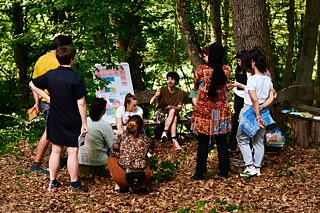Common Waste
Common Libraries
The 4 Teams and their ideas
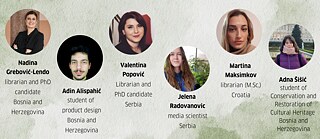
The CO-lib project successfully created a website designed to provide a variety of toolkits for librarians and patrons, significantly improving library operations and services. Each toolkit includes video materials in the form of presentations, thoroughly covering specific topics, alongside workshop guides containing detailed instructions for organizing educational sessions. The project was informed by trends shaping the library experience in 2023, such as digital transformation, smart speaker technologies, sustainability, flexible community spaces, and the emergence of new library standards. In response to these trends, the toolkit topics covered library resource management, digitization, academic database searches, organizing literary events, and information technology education. The project targeted both librarians, aiming to enhance their professional skills and knowledge, and patrons, who sought to better utilize library resources. Through these efforts, CO-lib enabled libraries to improve services by equipping staff with the necessary skills and educating patrons, ultimately fostering greater engagement and satisfaction among all library users.
The comprehensive website hosts a range of toolkits for librarians and patrons. Each toolkit includes video presentations on specific topics, accompanied by detailed workshop guides to facilitate educational sessions. In its initial phase, the project successfully addressed three key topics:
- Open Journal System
- Green Libraries
- Digital Tools
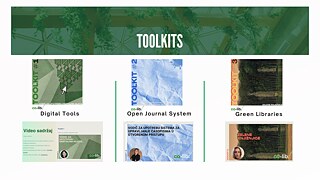
The website serves as a centralized, user-friendly platform for accessing these resources. Continuous updates and curation ensure the toolkit content remains relevant and comprehensive. As a result, librarians enhanced their skills, and patrons benefited from improved library services, which contributed to increased satisfaction among the library community.
In addition to the website, the project established a strong social media presence on Facebook and Instagram. Through these platforms, CO-lib regularly promoted content from the website, sharing articles, blog posts, and other educational materials. Visual content, including graphics and video clips, helped engage users and promote the project’s offerings, further increasing visibility and participation in the toolkit resources.
The materials are available in Bosnian, Serbian, and Croatian languages.
Links to project:
Website CO-lib
YouTube
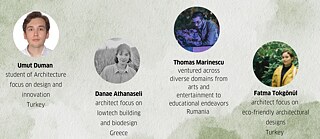
What is Mycelium?
Mycelium is the root-like structure of fungi, consisting of a network of fine, thread-like filaments called hyphae. It forms the vegetative part of fungi, typically found underground or within decaying organic material.
Mycelium plays a crucial role in ecosystems by breaking down organic matter, recycling nutrients, and forming symbiotic relationships with plants.
Beyond its ecological role, mycelium has gained attention for its potential in sustainable technology and materials science. It can be used to create eco-friendly products like:
Biodegradable Packaging: Replacing plastics and Styrofoam.
Construction Materials: Mycelium bricks, insulation, and panels.
Textiles and Fashion: Mycelium leather, a sustainable alternative to animal leather.
Health Products: Nutritional supplements and meat substitutes, with potential for medicinal applications.
Mycelium’s fast growth, versatility, and ability to use agricultural waste as a substrate make it an attractive option for environmentally conscious innovation
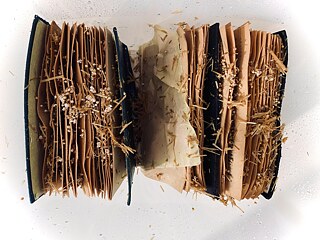
Purpose
The purpose of book•it is to drive open-source research on mycelium, foster sustainable practices, and empower communities. The project aims to lead mycelium research, promoting eco-conscious initiatives in libraries and beyond.
Target Audience
This project is aimed at educators, sustainability advocates, libraries, and community spaces interested in innovative, eco-friendly materials.
Future Plans
While our team will be pursuing individual paths due to distance and scheduling commitments, we remain committed to continuing mycelium research independently. Each of us will explore different aspects of prototyping scalable mycelium-based products, such as furniture and building materials. Although our formal collaboration under book•itwill not continue, we hope to contribute to a shared understanding of mycelium by engaging with sustainability and educational organizations individually. We also aim to stay connected through informal knowledge exchanges to further promote community-led sustainability.
Presentation at Final Event:
Contacts:
Fatma Tokgönül | ftokgonul@gmail.com
Danae Athanaseli | thanaselid@gmail.com
Thomas Marinescu | thomas.marinescu@icloud.com
Umut Duman | umutduman91@gmail.com
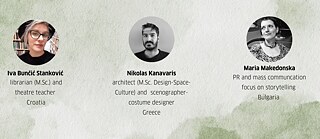
"Change the Script" is a vibrant, creative initiative designed to reignite a love for reading and bring communities closer together through the transformative power of theater. At its core, the project revolves around the imaginative recycling of discarded library books, transforming them into dynamic performances that breathe new life into forgotten stories. We envision libraries as cultural hubs where people rediscover their passion for books and theater becomes a powerful link to forgotten emotions, characters, and worlds. By turning discarded books into scenographic elements such as sets, costumes, and props, the project embraces both storytelling and sustainability.
The Collaborative Process
The success of "Change the Script" lies in collaboration between a Library and local artists- a dramaturg and a scenographer and two actors-. It all begins with raising awareness and encouraging people to donate unused books in the Library. This is followed by two key workshops: the first is a dramaturgy workshop where participants collectively craft a new storyline, and the second is a scenography workshop, where the donated paper is transformed into the imaginary world of the performance by crafting sets, costumes, props, and masks. With these elements in place, the actors and creative team bring the story to life in a performance staged in the Library.
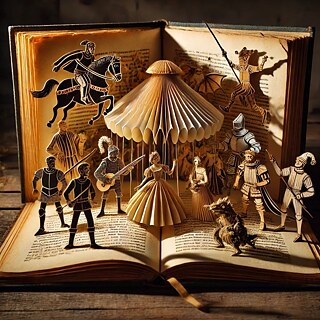
The project aims to foster new collaborations between libraries and cultural institutions, while developing skills in creative recycling and community engagement. By connecting theatrical creation with library spaces, "Change the Script" establishes theater as a sustainable artistic practice that promotes material recycling. The goal is to provide librarians with a toolkit for creating their own sustainable theatrical projects, enriching library spaces with innovative, community-driven performances.
Pilot Project and Future Expansion
A pilot implementation of "Change the Script" is currently underway at the Vladimir Nazor Library in Zagreb, where the process is being documented to create visuals for the project's toolkit. The crafted materials from the performance will be exhibited in the library, offering a tangible connection to the creative journey. We also plan to link the project with the Paper Art Festival in Bulgaria, bringing the artistic and sustainable elements to a broader audience. Looking ahead, the project will expand to Sofia in collaboration with Goethe Bulgarien and to Athens with Goethe Athens. Stay tuned to our Facebook page for updates as we continue to transform discarded books into new worlds, one performance at a time!
Social Media: Facebook
Contact:
Iva Bunčić Stanković (Croatia), iva.buncic@gmail.com
Nikolaos-Ioannis Kanavaris (Greece), nick.kana@gmail.com
Maria Slaveva Makedonska (Bulgaria), makedonska.m.s@gmail.com
Our project, "The Sustainable Neighbors," is an initiative led by four passionate young women with a shared vision to make libraries more sustainable. Our project targets three key groups: librarians, the general public, and children (students). To better understand current awareness levels, we conducted a survey among librarians to assess their knowledge of sustainability and to inform the broader community. Based on the results of this survey, we developed a comprehensive guide outlining strategies for making libraries more sustainable. In addition, we organize events designed to educate library patrons about sustainability through workshops, open discussions, and educational programs. These activities aim to foster a deeper understanding of environmental issues and the importance of sustainable practices.
What sets our project apart is its innovative approach, rooted in research on the current operations of libraries. Our action plan is directly informed by this research and tailored for practical implementation.
The project is adaptable and can be implemented in various types of libraries, with minor adjustments depending on the specific context. For example, in an art library, educational programs might be designed around paintings of green landscapes. These artworks could then serve as a bridge to discussions on the environmental degradation caused by human activity, raising awareness of the need for environmental preservation.
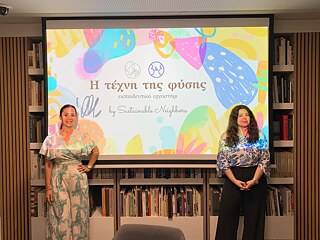
To support our mission, we created a website, where we publicly share all our information, resources, and documentation related to the project. Additionally, we established a social media presence under the name “sustainable_neighbors” to reach a wider audience and encourage community participation in sustainability initiatives. Through these efforts, we aim to create a network of informed individuals who can advocate for and implement sustainable practices in their communities.
Feel free to contact us anytime for further questions or possible collaborations!
Links:
website
Instagram: sustainable_neighbors
Ideathon in Zagreb
During these three days, they learned about the waste problem, sustainable design and listened presentation of the good green library from the city of Karlovac in Croatia. Aside from learning, an even more important task for them was to set up transnational teams that would work on their ideas in the upcoming months. They initialized their ideas, discussed it, and created the teams on the second day of the training. This was a dynamic and intense process, so it was good that we were doing it in nature, at the Recycled Estate, a home of the project partner – Green Network of Activist Groups. Recycled Estate is an eco-social educational centre for permaculture design and sustainable living so participants were able to see how it looks when in practice someone tries to connect sustainability, commons, waste reduction, circular economy, and many more areas at once.
Like in a proper Ideathon and design thinking process, participants were boiling and framing, flying up and landing on the ground their ideas. During their internal discussion and as inputs from the facilitator and three mentors, ideas were further reframed and questioned, improved and clarified, and changed a bit or a bit more. We ended up with four teams that consisted not only of participants from different countries but also of participants who had different backgrounds. That means they are active at their workplace, in local communities, and in society by having different roles: librarians, activists for waste issues and sustainability, learners about the circular economy, and students or practitioners in design. They cover all of the most important topics of the project Common Waste - Common Libraries. Since the main goal of the project was to connect these areas with improvements in the library areas, it is interesting to list the final outcome of the Ideathon and four teams:
Co-Lib - supporting educational toolkit for librarians
Sustainable neighbors - survey on the state of the art in the libraries and educational program on sustainability for the librarians
Change the Script - using the theatre performance and reuse of paper in the pursuit of falling in love with the books
Book it - an idea that praises circularity with the reusing of paper to produce mushrooms that will end up like a possible construction material to implement in libraries
On the last day of Ideathon we came back to the library at Goethe-Institut Zagreb and that day was devoted to fine-tuning the project ideas and their presentation in front of the audience with Q&As. We have quite a diverse teams and ideas, so the next step is to polish and test them until September 2024.

Second day of Ideathon: Start of teambuiling and design thinking process at the Recyle Estate in Vukomerić | © Goethe-Institut/Matej Marjanović

Drazen Šimleša (ZMAG) guides through the eco-social educational centre for permaculture design and sustainable living “Recycle Estate” | © Goethe-Institut/Matej Marjanović

Warm up: The participants take on various tasks in nature | © Goethe-Institut/Matej Marjanović

Ivana Borovnjak gives a lecture on Meaningful Design | © Goethe-Institut/Matej Marjanović

The participants are listening and taking notes of the lecture | © Goethe-Institut & Matej Marjanović

The Open Space: Facilitator Yanina Taneva explains the process of design thinking to the particpants | © Goethe-Institut/Matej Marjanović

Participant Thomas presents his first project idea in the panel and seeks team members | © Goethe-Institut/Matej Marjanović

Participants Nikolas and Maria present their first project idea in the panel | © Goethe-Institut/Matej Marjanović

Break: vegan lunch from the open kitchen | © Goethe-Institut/Matej Marjanović

Group discussions between the participants and the mentors | © Goethe-Institut/Matej Marjanović

Participants Hilal (l.) and Meliha (r.) are working on their final presentation for the last day of Ideathon | © Goethe-Institut/Matej Marjanović
Participant bio's
Find here the Booklet with Short biographys of our mentor team and all the participants.Partners
Common Waste is being realised by the Goethe-Institut in Athens, Belgrade, Bucharest, Istanbul, Sarajevo, Sofia, Thessaloniki and Zagreb in cooperation with our partner Green Network of Activist Groups (ZMAG).
